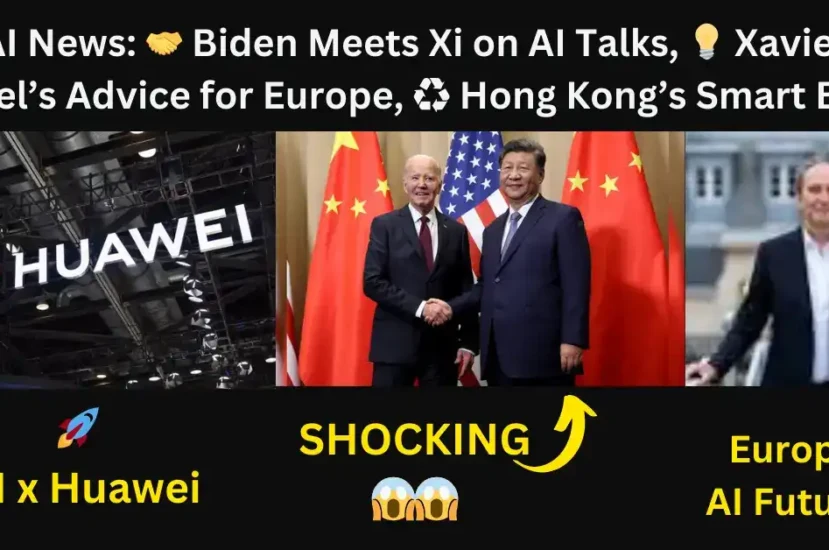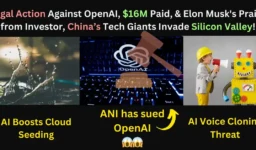“01.AI x Huawei: A Game-Changing AI Ecosystem Unfolds!”
01.AI partners with Huawei to develop Ascend-native AI models, leveraging advanced tech like MindSpore and MindIE. This collaboration targets industries like finance, energy, and transport.
Key Points:
- Focused on industrial AI transformation with large model solutions.
- Covers automation in finance, telecom, manufacturing, and more.
- Strategy: “Infrastructure + Model + Application” for B2B growth.
Carter Pro: The Human-Friendly Robot Revolutionizing Warehouses!
Robust AI’s Carter Pro is setting new standards for collaborative robots. It works safely alongside humans, offering features like a handlebar for manual control and camera-based navigation for cost efficiency.
Key Highlights:
- Human-Robot Collaboration: Easily moved by humans, Carter senses force and adjusts accordingly for smooth operation.
- Safety First: Designed for safe interaction, addressing risks of robots in human workspaces.
- Smart Tech: Uses cameras over lidar for cost and operational benefits in warehouse settings.
- Modular Integration: Fits with off-the-shelf shelving, simplifying warehouse adoption.
- Client Strategy: DHL is an anchor client, but Robust prioritizes a diverse customer base to avoid overdependence.
Factiverse: AI to Battle Disinformation in Real-Time!
Norwegian startup Factiverse is tackling online disinformation with AI. Their B2B tool provides live fact-checking for text, video, and audio, helping businesses save research time and reduce legal risks.
Key Highlights:
- Live Fact-Checking: Factiverse provides real-time fact-checking for multiple media types to ensure credibility.
- AI for Trust: Trained on high-quality data from trusted sources, Factiverse’s AI outperforms traditional models like GPT-4 in accuracy.
- Growing Reach: The startup, backed by $1.45M in pre-seed funding, has already partnered with media and finance sectors.
- Future Plans: Factiverse aims to expand globally and raise a seed round in 2025 to increase speed and impact.
Xavier Niel: Europe’s AI Future Depends on Patience and Innovation!
Xavier Niel, a leading tech investor, believes Europe can build competitive AI firms without the massive funding of U.S. and Chinese counterparts, but warns founders not to sell out too early. He sees great potential for European startups, but success will depend on founders’ ability to stay focused and avoid quick buyouts.
Key Insights:
- European AI Potential: Niel argues that with €100-200 million, Europe can create powerful AI models, as seen with companies like Mistral, valued at €6bn within a year.
- Patience Over Quick Payouts: Founders need to resist selling their companies too soon, as they might undervalue their businesses, potentially worth two to three times the initial offer.
- Innovation vs. Regulation: While Europe has fallen behind in past tech waves, Niel stresses the need for AI innovation with European values like privacy and transparency to avoid being sidelined.
- The AI Opportunity: Niel believes there’s still time for Europe to create multiple AI winners, as the market is large enough for many players to thrive.
CFOs Eye GenAI’s Long-Term Potential, Despite Mixed ROI Results
A recent PYMNTS Intelligence report shows that while GenAI is being increasingly adopted for tasks like financial reporting and data visualizations, CFOs are still grappling with limited ROI from their investments. Despite this, many large companies are boosting their GenAI budgets, signaling a belief in its future potential.
Key Highlights:
- Growing Usage: 60% of CFOs now use GenAI for medium-complexity tasks like forecasting, up from 35% in March. This marks a shift towards more strategic AI applications beyond routine tasks.
- ROI Challenges: Only 13% of CFOs report “very positive” ROI, down from 27% earlier this year. 65% point to limited returns as a major issue, yet they are still planning to increase their investments.
- Ongoing Investment: 78% of CFOs plan to boost their GenAI spending in the next year, with middle-market companies increasing their budgets by 19% compared to only 6.2% for those with lower ROI.
Future Outlook:
- Integration Timeline: Companies with positive ROI expect full GenAI integration by 2030, while others estimate a longer timeline, up to 15 years.
- Strategic Role: Despite ROI concerns, the long-term benefits are clear: GenAI promises to streamline operations, enhance decision-making, and give firms a competitive edge.
AI Revolutionizes Echocardiography: Faster, More Accessible, and More Accurate
A recent prospective randomized controlled trial has shown that artificial intelligence (AI) can significantly improve echocardiography by speeding up the process, producing better-quality images, and reducing fatigue for operators. The study used AI-powered software like Us2.ai (developed across 11 countries) and PanEcho (from Yale and the University of Texas), both of which can analyze a wide range of heart functions and structures automatically.
Key Findings:
- AI’s Impact on Speed and Quality: The trial revealed that AI could generate values for 85% to 99% of tasks, with AI-enhanced images rated higher in quality (41%) compared to non-AI images (31%). AI also reduces the variability in interpretation, making results more consistent across different operators.
- Overcoming Shortages in Skilled Personnel: AI can help overcome the bottleneck caused by a shortage of skilled professionals. AI models, trained on millions of videos and images, can automate the selection of views needed for accurate diagnosis, making it more accessible in areas with fewer experts.
- AI’s Potential in Global Healthcare: AI-driven echocardiography could provide automated cardiovascular healthcare to populations with limited access to highly trained personnel, improving global health outcomes.
Biden and Xi Agree on AI’s Role in Nuclear Control Before Trump’s Return
At the APEC summit, Presidents Biden and Xi reached a crucial agreement on AI, especially regarding nuclear weapons control. This meeting is pivotal as Biden prepares to hand over U.S.-China relations to Trump.
Key Points:
- AI and Nuclear Control: Both leaders agreed AI should not control nuclear weapons systems, ensuring human oversight in critical decisions.
- Prevention of AI Warfare: The agreement aims to stop AI from making life-or-death decisions during global crises.
- AI Regulation: This deal marks a step forward in regulating AI in military and sensitive security sectors.
🤖 Hong Kong Start-Up’s AI-Powered Smart Bin Revolutionizes Recycling
Green AI Technology, a Hong Kong-based start-up, is set to launch an AI-driven smart bin designed to improve waste sorting and boost recycling efforts in the city. This innovative technology is backed by the Hong Kong Productivity Council and aims to help commercial buildings and shopping centers meet sustainability goals.
Key Features of the Smart Bin:
- 🤖 AI Sorting: The bin sorts waste into four categories—plastic bottles, aluminum cans, drinks cartons, and general refuse.
- 🏢 Target Audience: Initially aimed at commercial buildings, shopping centers, and hotels, where waste reporting is essential for sustainability.
- 🧳 Advanced Technology: Equipped with scanners, conveyor belts, and a digital scale for accurate sorting, weighing, and compression to maximize storage.
Impact on Recycling:
- 🌍 Boosting Recycling: Green AI’s smart bin supports Hong Kong’s goal to raise the city’s recycling rate from 32% to 40-45% by 2035.
- 💡 Addressing Challenges: The city lags behind European countries in recycling rates, with initiatives like waste-charging schemes and mandatory producer liability to increase recovery.
- 💼 Automation in Recycling: Green AI has also developed an AI-driven waste sorting machine for the post-collection market, helping automate manual sorting operations.




Leave a comment